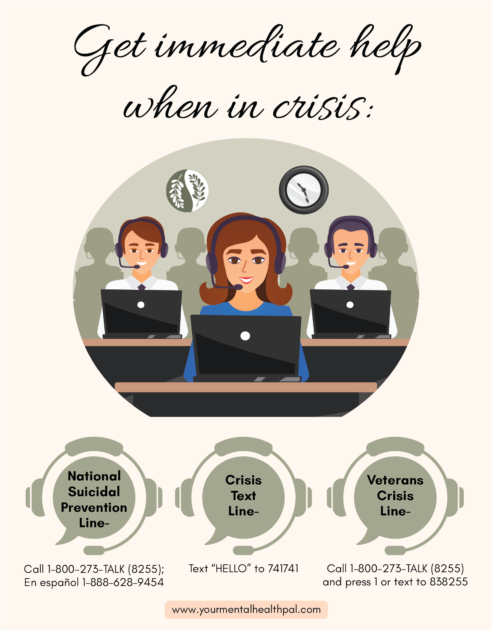
Are you experiencing anxiety or mood swings? Or do get the urge to withdraw from the normal activities? Have you noticed drastic changes in your personality, eating habits or sleeping patterns?
But you don’t know what to do? Don’t worry, this blog post will help you learn when and where to get mental health help.
Experiencing these signs is a warning that your mental health needs attention.
Being mentally healthy allows you to be confident in your worth and talents, accept your strengths and flaws, make realistic objectives, and find meaning and purpose in your life. Emotional and mental health are interconnected.
Mental health is not just about people not being able to handle their emotions. It’s so much more than that. In this blog post, we will guide you through the helplines available for you.
But before that, let’s go through some of the mental health problems that are commonly faced by people.

Where to get mental health help
Mental Health Issues
Mental health issues have a wide spectrum. Sometimes the symptoms of the same disorder can vary from person to person. And every disorder has its different symptoms such as:
1. Anxiety
These disorders are a group of mental health disorders that includes generalized anxiety disorders, like social phobias, Obsessive-Compulsive Disorder (OCD), Post Traumatic Stress Disorder (PTSD), and panic disorders. Anxiety needs to be treated and, if left unattended can lead to severe mental health issues.
2. Psychosis
Delusions, hallucinations, and muddled thinking are common symptoms of psychosis. Various mental conditions that can result in psychosis include Schizophrenia and mood disorders.
Medication and psychological assistance can help alleviate, if not wholly eradicate, psychotic symptoms.
3. Eating Disorders
There are several examples of eating disorders, such as Anorexia, Bulimia Nervosa, etc. Both women and men are affected by eating disorders, which can have significant psychological and physical implications.
4. Paranoia
The unreasonable and persistent belief that individuals are ‘out to get you‘ is paranoia. It can be treated with both medication and psychological assistance. Mental health illnesses like paranoid personality disorder, and Schizophrenia can cause paranoia.
5. Post-Traumatic Stress Disorder (PTSD)
PTSD is a mental health illness that can occur after any stressful incident. Significant issues occur to the symptoms of PTSD, in social, professional, and romantic interactions. This mental health issue may also make it difficult for you to carry out regular activities.
6. Schizophrenia
Schizophrenia is a complicated psychotic condition marked by disturbances in thought, emotions, and a skewed perspective of reality.
The symptoms can range from:
- hallucinations,
- delusions,
- mental illness,
- social isolation,
- lack of drive,
- impaired thinking,
- poor memory, and
- Suicidal thoughts.
7. Depression
Depression is a condition characterized by a poor mood, loss of interest and enjoyment, and a lack of energy. It’s more than simply being sad. Depression exhibits itself in many ways and with symptoms of varying intensity. It might raise the likelihood of suicidal thoughts or behaviors.
However, not all depressive symptoms are present in every case. Some people may only have a few symptoms, whilst others may have numerous.
Where to seek help for Mental Health?
Now that we have discussed the various mental health issues, here are the ways that might aid you to seek mental health help.
Therapy and medicine, or a combination of the two, are typically used to treat mental health disorders. Treatment can be received in person, via phone, or by computer. Knowing where to begin when seeking mental health treatment can be challenging, but there are numerous options for finding a helpline service that will suit your requirements.
1. Get Immediate help when in crisis
Here are a few of the emergency helpline services to assist you with your mental health.
National Suicidal Prevention Line
Call 1-800-273-TALK (8255); En español 1-888-628-9454
You can also use their lifeline chat on their website. The Lifeline is a free, confidential crisis line open 24 hours a day, seven days a week.
Crisis Text Line
Text “HELLO” to 741741
The Crisis Text hotline is open 24 hours a day, seven days a week throughout the United States.
Veterans Crisis Line
Call 1-800-273- TALK(8255) and press 1 or text to 838255
The Line is a free, confidential resource that connects veterans with a professional responder 24 hours a day, seven days a week.
You can go to the National Institute of Mental Health for more information.
2. Ask for help
You can start talking to your loved ones and tell them how you feel. There’s no shame in asking them for help.
3. Medical Practitioners
You can also seek professional help, like a therapist, to ask for help. A doctor or therapist may be a valuable resource for first mental health screenings and referrals to mental health experts. Consider bringing up your mental health difficulties and asking for support if you have an appointment with your primary care physician.
4. Insurance
If you have health insurance, a representative from your insurance company will tell you which policy covers local providers. Many health insurance providers’ websites include searchable databases that allow you to locate a participating practitioner in your region.
5. Foundations
Many foundations work day and night to help people suffering from mental health. They frequently include information on finding a mental health professional on their websites, and some have practitioner locators. Some of them are-
Anxiety and Depression Association of America
Depression and Bipolar Support Alliance
National Alliance on Mental Illness
It might be challenging to decide which provider is correct, but we’ve got you covered: Here are some of the questions you might want to ask a potential provider:
- Is your service specialized in helping others with my problem?
- How do you generally handle someone with my problem?
- How long do you think the therapy will last?
- Do you accept my health insurance?
- What are your charges?
Conclusion
We encourage you to go forward and seek mental health help. Your mental health matters just as much as your physical health.
Treatment is most effective when you connect positively with your mental health physician. If you aren’t comfortable or believe the therapy isn’t working for you, speak with helpline services or consider seeking another practitioner or an alternative treatment. Consider discussing with your doctor or another trusted adult if you are a kid or adolescent.
Feel free to speak your mind in the comments below!
Now that you know where to seek mental health help, we hope you actively seek help. If you feel hesitant to do so due to the stigma attached to mental health, then click here.
To discover more about mental healthcare, subscribe to Your Mental Health Pal.

